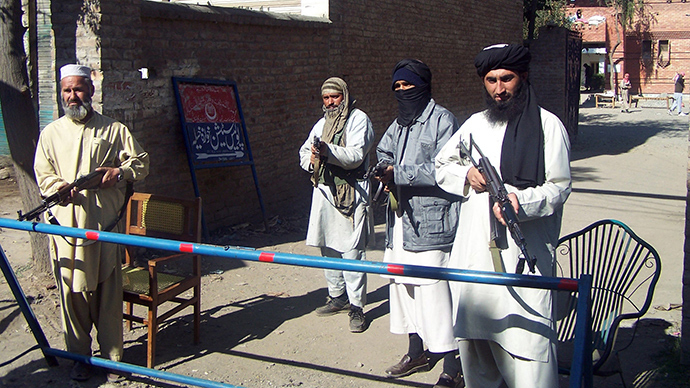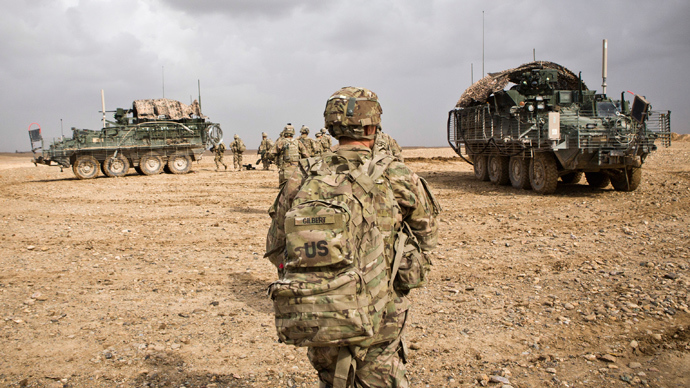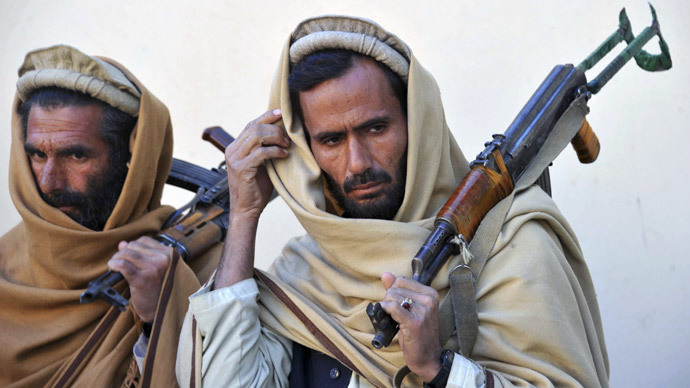‘Afghanistan remains a cockpit of Asia’

The Taliban is not a spent force yet, and Afghanistan will continue to be an extremely volatile area, says journalist Jere Van Dyk. There’s also a chance that this network as well as ISIS can spread into the Central Asian republics, he told RT.
RT:You spent almost two months as a prisoner of the Taliban. Could you tell us a bit about it? What was your relationship with your captors like? How were you treated?
Jere Van Dyk: Yes, I was captured by the Taliban, the first American taken by them. I was in the mountains of Pakistan, just across the Afghan border. My relationship with them depended upon the jailer, it depended upon the time, and it depended upon the day. Sometimes there were mock executions - times I was afraid that I would never survive. I was under tremendous pressure to convert to Islam if I ever wanted to leave. It was a matter of constant fear, constant worry. There was a drone overhead, I don’t know even today if that drone was there to look for me or to kill the Taliban because I was in the Taliban wait station where they keep coming and going.
However, they never physically harmed me. There were mock executions of course, they still resonate. But they made a point, saying to me “We can do whatever we want to you. You torture us in Guantanamo but we are not like that, we are not going to harm you.” So physically they never did. I had one jailor who was to frighten me, another jailor less so, so there was a bit of as we call it in American television “a good cop and bad cop.” One of my fellow captives turned against me, so I was never able in my own way to act freely. We were in a dark room, never allowed to go outside more than two minutes or three minutes at night to use the rest room at one time. My fellow prisoners were chained; I was not chained to my bed. That is something I will always of course remember.

RT:The US is leaving a small military contingent in Afghanistan. What is going to happen after the withdrawal?
JV: I don’t know exactly what is going to happen. After 13 years of the coalition’s presence … now that they began to pull out, the United Nations just this week posted a memorandum notice to say that more civilians were killed this year than in any time in Afghanistan since 2001 - 30 percent higher deaths of children, 14 percent higher of women. Never before have we seen this many deaths. What this means is that the Taliban now that America and its NATO allies plus others are moving out in great numbers, and the US for the most part will draw out the entirety of its forces by the end of this year, that the Taliban are filling that vacuum. It means also that the Afghan national army - which America and its allies are depending upon to take up the slack, to do what the Americans and NATO have been doing, that far has not been able to. There was a story in the New York Times just yesterday which said that areas in the south, which is the Taliban-Pashtun area - the largest ethnic group in the world without a homeland and the Taliban are very much aware of this - are coming back into the country. Right now the key to this war is not going to be just so much in Afghanistan; it’s going to be across the border in Pakistan.
RT:Is the Taliban really a spent force?
JV: No, the Taliban are not a spent force at all. The Taliban has a deep reserve for recruits from which to pick in Afghanistan and Pakistan. All Pashtuns on both sides of their border, they are showing us that after literally 13 years of war the Mujahidin, those who fought with the Soviet Union, are in many ways the fathers and grandfathers of the militant groups of the Taliban today. For 30 plus years now these people have been fighting and they are not going to give in. The fact that there are more and more moving in the country shows that they are not.
What is important is that the US has wanted China to fill that vacuum. Ashraf Ghani, the new President of Afghanistan, in his first foreign visit visited not India, which has been traditionally a very close ally of Afghanistan, but China, and his second visit was to Pakistan. This is the key right here. Thirdly, just this past week Russia has a new alliance with Armenia, Tajikistan, Kyrgyzstan, Kazakhstan, Belarus – have formed a security alliance out of fear of what is going to happen in Afghanistan because all of them collectively are afraid not just of the Taliban but of ISIS, the Islamic State in Iraq moving through its allies, through this networks that began during the time when the Soviet Union was in Afghanistan into the country, probably into the troubled areas of Afghanistan and up into possibly the Central Asian republics, perhaps even to Russia itself, to Armenia and Belarus. This by no means is over. When the British were there, the head of the British Raj said “Afghanistan is a cockpit of Asia,” it remains so today.

RT:Do you think Afghanistan is ready to confront the Taliban by its own means? Given the rising number of casualties and the Taliban’s fighting capacities it seems that the US is overestimating Afghanistan’s ability to deal with the problem itself. What’s your take on this?
JV: I think the US is very much aware that the rising deaths and rising civilian casualties, that the Taliban is not finished and that the Afghan national army is not yet able to take over and fill this vacuum entirely. That is why just this past week we saw that 450 troops from Romania are going to go to Afghanistan. I think you are going to see a presence in the country until the time America and its allies feel - and this will not work out alone, they have to work with. With Pakistan, many Taliban headquarters are in Pakistan, there is a good Taliban and bad Taliban that we are going to hear of. The good Taliban, according to Pakistan, are those in Afghanistan. Until such time that is resolved with China, with Pakistan that the US and its allies – the British, the French, the Canadians, the Romanians have gone and who else will go back in – we are all going to see, unfortunately, a residual force of American forces and their allies for some time.
RT:The US is leaving a small military contingent in Afghanistan. Some say, it is meant to conduct observations of neighboring Russia, China and Iran. What do you think?
JV: We have heard that, I certainly don’t have any insider information on that. The Iranians have always been worried about being surrounded on both sides by the US in Iraq, when the US was there, in Afghanistan, where the US has a much larger presence. Would it be feasible for the US to use it as a base to monitor areas in other countries? Certainly. I think what the US does, I’m not certain of that, but it remains, and will continue to be an extremely volatile area. Not just because of the Taliban – because of ISIS. The Islamic State is moving more in there, so the US is going to maintain its presence there. It doesn’t want to see Afghanistan again revert to Al-Qaeda. As we all know, relations between the US and Russia are not the best right now, it’s very awkward. Russia and China are coming closer together, China and the US have their own relations, the US has been close to Pakistan, and what role India is going to play…Of course America will want to maintain its presence to some degree in that area. What is going to transpire - I wish I knew.
The statements, views and opinions expressed in this column are solely those of the author and do not necessarily represent those of RT.
The statements, views and opinions expressed in this column are solely those of the author and do not necessarily represent those of RT.












